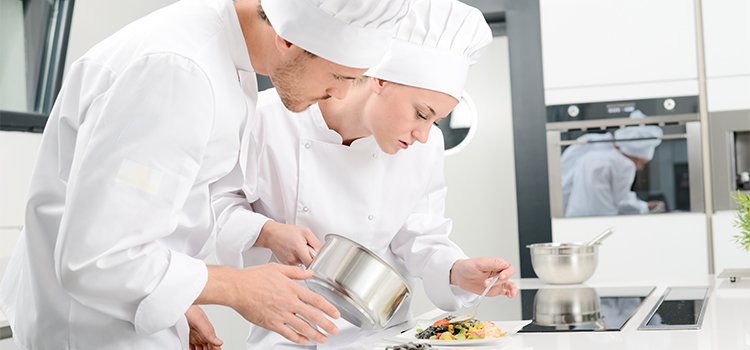How to Choose a Culinary School
Find out if culinary school is right for you—then learn all about your school options.

Cooking School Is Worth It
Getting your cooking school degree can open doors for your career. Building a foundation of skills and techniques that you'll be able to draw upon for years to come is an investment in your future. A formal culinary education provides you with a broad overview of cuisines, theories, ingredients and techniques that restaurant experience alone cannot deliver. A culinary education will allow you to:
- Stand out from other applicants in a competitive job market.
- Demonstrate your commitment to future employers.
- Acquire a wide range of culinary knowledge.
- Have the time to indulge your culinary creativity.
What to Look for in a School
Culinary schools vary in their approach to teaching. Different culinary schools suit the needs of different kinds of students. With a little investigation, you'll find the right program for you. Consider adding the following items to your checklist:
- Visit the cooking school to see classes in action.
- Talk with students and faculty.
- Compare the curriculum and course descriptions.
- Find out if the cooking school is accredited.
- Compare the student to faculty ratio.
- Make sure the cuisine focus matches your interests.
- Check for flexibility in class schedules.
- Check for externship opportunities.
- Ask how many graduates find jobs after graduation.
- Find out if the graduates are working where you'd like to work.
Differences Between Programs
Different types of cooking schools offer different kinds of training:
- Culinary Institute: Culinary institutes offer cream-of-the-crop education for those who are serious about becoming certified culinary professionals. They generally offer degree, diploma, or certificate programs, ranging in length from two months to four years.
- Cooking School: Cooking schools are smaller versions of culinary institutes for cooks who want specialized training. They generally offer certificate or diploma programs only. Program lengths range from two months to four years.
- Cooking Classes: While cooking classes don't award certificates or diplomas, they are great for serious cooks who want to learn more about cooking. Short seminars range from two days to two months.
Cooking School Tuition
If you choose a public institution, remember that out-of-state tuition is higher than resident tuition. When estimating costs for each cooking school, remember to include program fees, textbooks, supplies, uniforms, housing and travel expenses. A culinary education is an investment in your future career, so be sure to look into your school's financial aid packages and scholarship opportunities.
Average Length of Cooking School Programs
Standard cooking school programs require 300 to 400 classroom hours and 200 to 300 externship or internship hours. Many culinary schools offer several degree/certificate and schedule options so that total program lengths range from 10 weeks to four years.
- Certificate/Diploma: one month to two years
- Associate: nine months to two years
- Bachelor's: four years
- Master's: two years
- Doctorate: six years
Training on the Job vs. Formal Education
Training on the job is certainly an option; however, it's a slower track. On the job, you'll learn only the type of cuisine served in the kitchen where you're working and only the techniques associated with your position.
Remember, kitchens are about production, not about teaching. Also, without an education, you'll start out in a lower position than cooking school graduates because you'll require more training.
FIND A CULINARY SCHOOL TODAY
Tell us a little about yourself and we'll connect you with schools that offer culinary arts programs.
